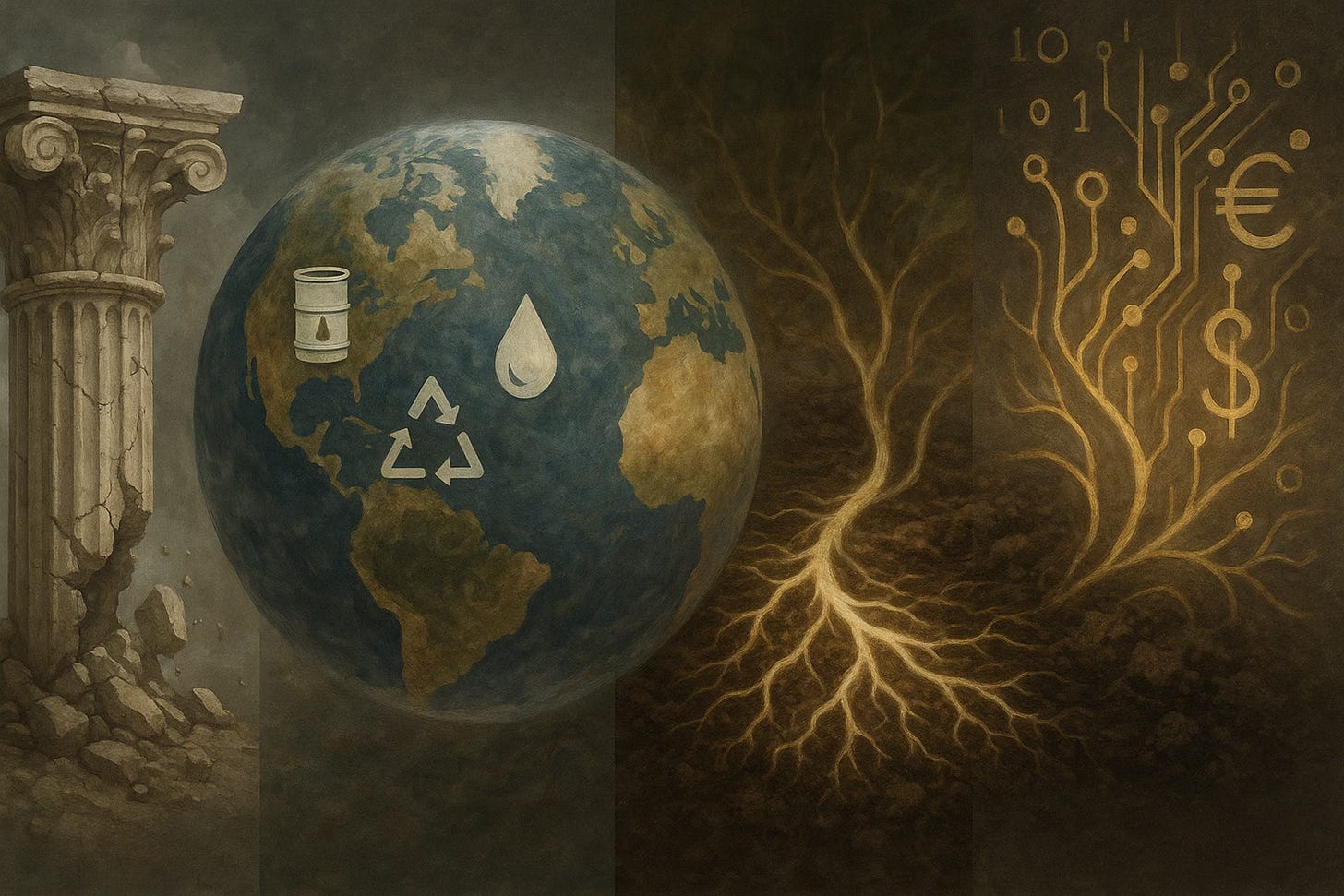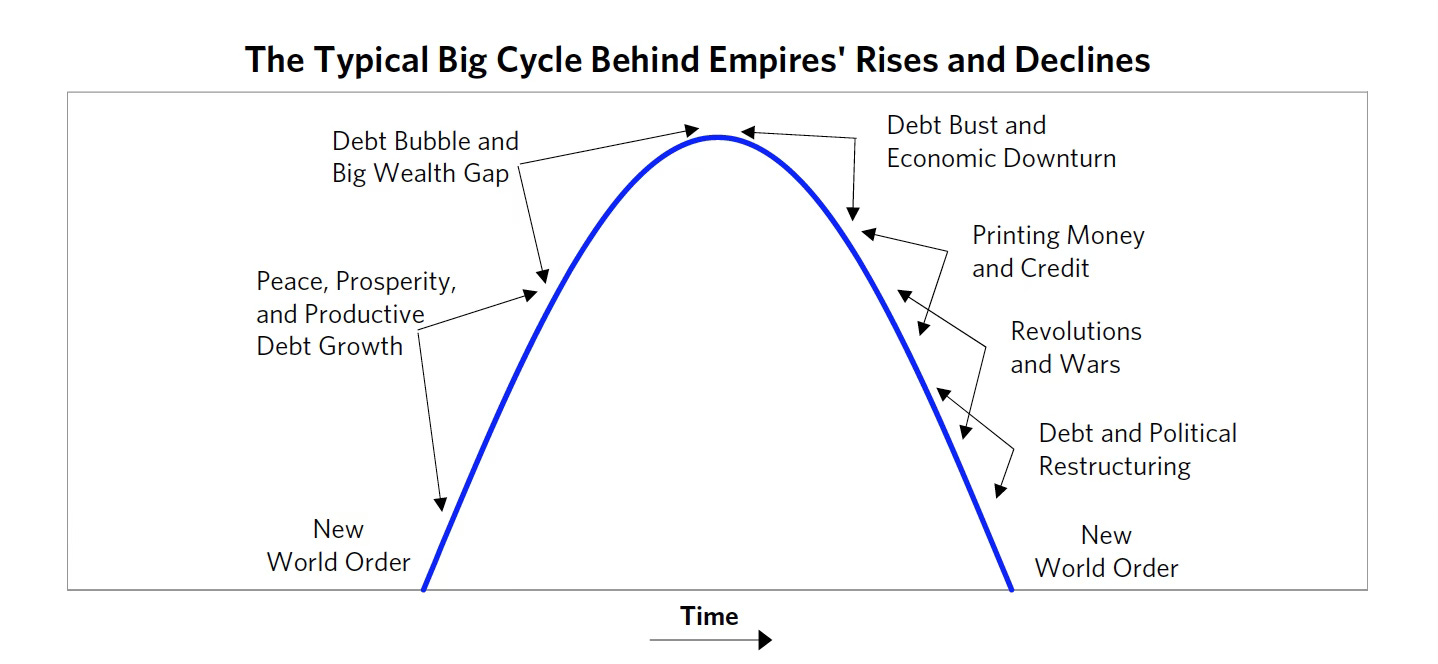The audio above is an AI-generated 'podcast' crafted with careful prompting and highly selected data sources, which you can view here. The podcast goes into more detail than the overview post below.
It feels like everything is happening at once.
The noise is deafening. The rules keep changing. The story flitters from one major event to the next. What felt solid yesterday now seems to be wobbling. If you feel overwhelmed, you’re not alone. But what if the chaos isn’t random?
What if it’s a pattern? A pattern you can’t unsee once you’ve seen it?
For the last two decades, I’ve tracked the signals of a global reset. It’s not a single event, but a convergence of powerful forces, all coming to a head around 2030. To see clearly, we don’t need more headlines. We need better lenses.
Any event happening today - in politics, in finance, in environment - can be understood by looking through at least one of these four lenses. This is the starting point. The context for everything that comes next.
1. The Empire is Ending
The first lens is the Cycle of Empire. This isn’t the first time a society has witnessed the End-of-Normal. History is littered with at least 26 prior cycles of rise and fall.

The difference is that this time, the cycle is global.
Our globalized system (the old world order) is in the final Decay phase of a well-established 7-phase cycle. The systems that defined the 20th century are fragile, and the promises they made are ringing hollow. This isn’t a political, economic, or ecological failure; it’s a feature of the cycle. Empires, by their nature, eventually run out of steam. Recognizing this pattern isn’t pessimistic. It’s realistic. It allows us to stop trying to patch a system that is designed to end and start thinking about what comes next. (Something new always emerges).
(To find all posts with this theme: https://nexus2030.substack.com/t/globalcycle)
2. The Planet’s Bill Has Come Due
The second lens is about much more than “climate change” and “sustainability.” Those memes have become a convenient distraction from a much simpler truth.
It’s about Overshoot.
Overshoot is when, in a given year, we extract more of the Earth’s resources than it can regenerate. We are using more than we have. William R. Catton wrote about this in 1980, calling it the ecological basis for revolutionary change.
“It is axiomatic that we are in no way protected from the consequences of our actions by remaining confused about the ecological meaning of our humanness, ignorant of ecological processes, and unmindful of the ecological aspects of history. I have tried to show the real nature of humanity’s predicament not because understanding its nature will enable us to escape it, but because if we do not understand it we shall continue to act and react in ways that make it worse.” — William Catton, Overshoot, 1980
In other words, overshoot is about much more than carbon in the air or plastics in the ocean; it’s about the large-scale depletion of water, soil, minerals, and land. Happens at the end of every empire, without exception. Overshoot is also the basis for evolutionary change. That’s the piece that most miss. Overshoot creates the space for a new world order to emerge. The conflicts we see brewing globally are increasingly about securing the little that’s left. That’s the easy, predictable bit.
To navigate what’s coming, we need a clear-headed ecological view of history. When we have a clear-headed view, we can stop making things worse through well-intentioned but misguided policies like SDGs, ESG and Net Zero.
Fortunately, that’s where the next lens comes in.
(To find all posts with this theme: https://nexus2030.substack.com/t/oshoot)
3. Humanity is Shifting Gears
The third lens is one not often spoken about: the undeniable shift in human consciousness. We are in the middle of the fifth Major Evolutionary Transition in 3.5 million years. It’s a leap as significant as the development of language.
We are moving from Material Consciousness to Mycelial Consciousness.
Material Consciousness is the operating system that built our modern world. It sees the world as a collection of separate objects to be measured, managed, and controlled. It’s defined by hierarchy, scarcity, and a separation between humans and nature. This mindset of “winner takes all” resulted in the explosive progress we’ve witnessed since the Agrarian Revolution. As with all living systems, the rapid growth phase is changing gears to a different form of growth.
Mycelial Consciousness, like the interconnected web of a fungal network, is an emerging worldview. It understands the deep interdependence of all systems -social, ecological, and economic. It’s characterized by collaboration, systemic understanding, and adaptive stewardship. This is how we’re changing gears in our growth: from physical growth to growth in wisdom and consciousness. We cannot expect everyone to (want to) participate.
This isn’t woo-woo, pie-in-the-sky idealism. It’s part of a well-established evolutionary pattern: from Mimetic to Magical to Mythic to Material Consciousness over three and a half or four million years. The leap to Mycelial Consciousness is the prerequisite for solving challenges that Material Consciousness created. Turns out Einstein was right. Our thinking must evolve beyond “sustainability.”
(To find all posts with this theme: https://nexus2030.substack.com/t/consciousness)
4. The Money Matrix is Glitching
The fourth lens concerns the metamoney cycle between debt-based and credit-based monetary systems.
The global financial system, built on ever-increasing debt, has reached its mathematical limits. An inevitable currency reset is on the horizon.
The easy, top-down solutions we’ll be offered are Central Bank Digital Currencies (CBDCs) competing with privately-issued stable-coins. This battle is the ultimate Thesis vs. Antithesis clash first described by German philosopher Johann Gottlieb Fichte (1762-1814) and later attributed to Georg Hegel (1770-1831), although he never used the terms Thesis, Antithesis, and Synthesis.
It remains unclear which path will win (CBDCs or private stable-coins), but both represent a step toward unprecedented surveillance and control.
But there’s another path, which is the Synthesis. The Evolutionary Impulse - the drive within all living systems to adapt and evolve into higher expressions of itself - shows us another way. From the foundation of the emerging consciousness, new forms of exchange are emerging: Mutual Aid Credit currencies.
Here’s the profound revelation: a monetary system based on trust and interconnectedness cannot (easily) be introduced into the old mindset of Material Consciousness. It can only emerge from the relational awareness of Mycelial Consciousness. It’s a currency and form of exchange that reflects an entirely different set of values, worldviews, and beliefs. (A systemic shock that rattles core beliefs makes the introduction of these emergent monetary systems easier. We’ll cover this in future posts.)
Beyond Conventional Sustainability: Why the Money Glitch Matters
While initiatives like the SDGs and ESG are vital frameworks for corporate responsibility, the unfolding “Great Unscrambling” demands a more profound, strategic shift from both corporations and investors. Beyond merely funding “sustainable projects,” the critical imperative now lies in understanding and actively participating in the coming monetary reset. This might entail a strategic redirection of capital into emerging mutual credit systems. True sustainability, in this evolving landscape, is less about optimizing within existing financial paradigms and more about proactively fostering and investing in the new forms of currency that will underpin a resilient, decentralized, and equitable local economy.
This theme, and the mechanics of such a transition, will be explored in greater depth in a subsequent essay. For now, here is a gentle introduction to the coming monetary reset:
The Unavoidable Monetary Reset
The audio above is an AI-generated 'podcast' crafted with careful prompting and highly selected data sources, which you can view here. It goes into more detail than the overview post below.
(To find all posts with this theme: https://nexus2030.substack.com/t/metamoney)
“Only a crisis—actual or perceived—produces real change. When that crisis occurs, the actions that are taken depend on the ideas that are lying around. That, I believe, is our basic function: to develop alternatives to existing policies, to keep them alive and available until the politically impossible becomes the politically inevitable.” - Milton Friedman, as quoted in Naomi Wolf's Shock Doctrine.
The Nexus Point
These four forces aren’t happening in isolation. They are converging, colliding, interacting, and accelerating one another. The end of the 377-year old global, class-based, debt-based empire is a mathematical certainty. The two primary drivers (with many supporting actors) are overshoot and levels of debt (in most Western nations) that already surpass the debt-to-GDP trajectory associated with the end of previous empires. The coming currency reset is a predictable last-minute attempt to arrest the empire’s decay.
And the shift in consciousness is the evolutionary response to it all.
NEXUS 2030 isn’t a story about the end. It’s a story about conscious participation in what comes next.
In future posts, we’ll dive deeper into each of these lenses. For now, the work is to see the pattern.
The world isn’t breaking down randomly. It’s breaking open. NEXUS 2030 allows us to consciously focus on what’s emerging.
References
Lens 1: Collapsology is a transdisciplinary study of the risks related to the general collapse of societies induced by climate change, scarcity of resources, widespread loss of biodiversity (extinctions), and natural disasters. Deep dive: https://bit.ly/CollapseLit
Lens 2: Overshoot includes climate change, resource wars, and migrations. Deep dive: https://bit.ly/O-shoot
Overshoot: The Ecological Basis of Revolutionary Change by William R. Catton (1982): https://bit.ly/WCatton
Lens 3: Major Evolutionary Transitions (METs) is a study of significant transitions in the evolution of collective human consciousness. We are currently living through the fifth MET. Deep dive: https://bit.ly/M-E-T
Emerging World: The Evolution of Consciousness and the Future of Humanity by Roger Briggs (2021): https://bit.ly/Em-World
Lens 4: The MetaMoney Pendulum is an observation that throughout history, monetary systems have oscillated between debt-based money and credit-based money. Our monetary systems are currently undergoing a similar, though not uncontentious, transition. Deep dive: https://bit.ly/Arc-Mon, which covers:
Debt: The First 5,000 Years by David Graeber (2011): https://bit.ly/Debt5000
Remaking Money for a Sustainable Future by Ester Barinaga Martín (2024): https://bit.ly/Alt-Econ
NEXUS 2030 AI Prompt Enhancer
For Paid Subscribers: The "Four Lenses" Prompt
This prompt can be appended to any existing prompt to help AI platforms surface the deeper systemic patterns behind surface-level issues, aligned with NEXUS 2030’s core framework. These lenses help reveal the structural forces behind surface events, enabling you to see beyond mainstream narratives to the deeper patterns shaping our collective future.
Listen to this episode with a 7-day free trial
Subscribe to NEXUS 2030 to listen to this post and get 7 days of free access to the full post archives.









